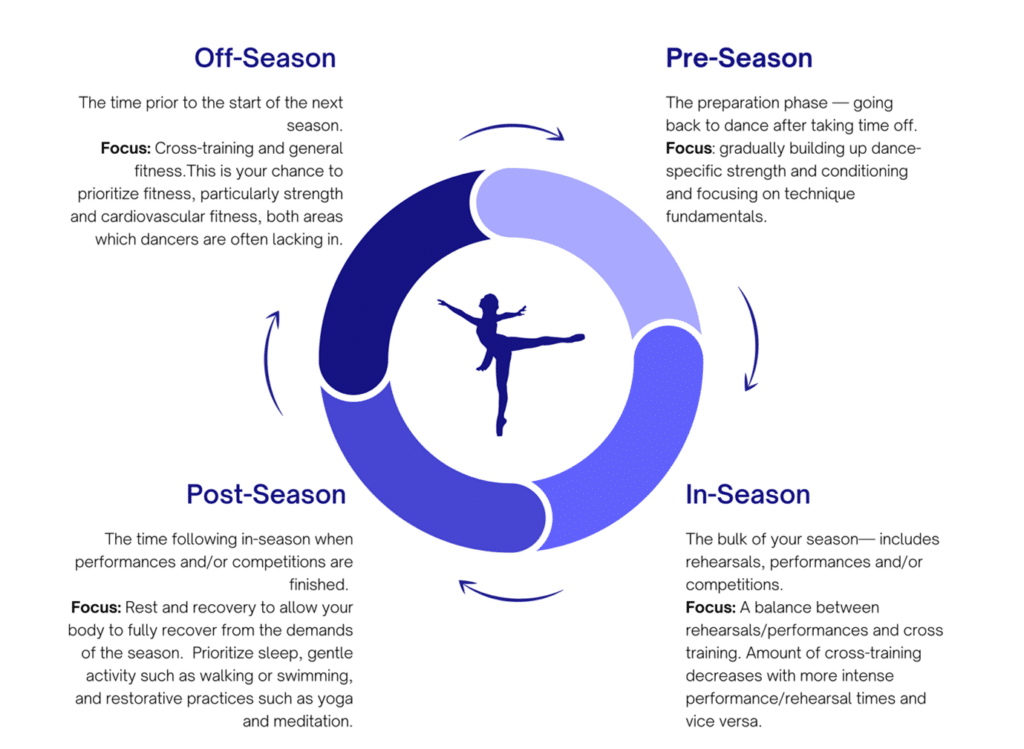Hello holidays! As we prepare for 2025, consider incorporating these strategies into your training program to get you ready for a non-stop year of dancing. There’s no better time to work on skills and movement capacity that require time to develop, e.g. strength training (requires at least 6-8 weeks to achieve a significant difference in strength), muscular or cardiovascular endurance training (to prep for those high energy numbers that just feel like 5 minutes of full out cardio).
This type of training is an application of a training concept known as periodisation training. The main objective: to reach a high level of performance and “athletic shape” after a given time. Several studies have found that athletes who trained using periodised models attained performance levels superior to those who did not.

Key things to include in off-season training:
- Mind-muscle awareness
- Overall strength
- Endurance
- Skill consistency
Principles of Periodisation
The main principle is to improve the dancer as a whole person.
It should include physiological, psychological, biomechanical, and skill elements. Training loads must have specific aims – i.e. be specifically addressed to physiological systems and functional capabilities that are appropriate to the performance demands. Break down skills and tricks to their individual components, and work on the components that are lacking e.g. strength, power, balance.
The training program can be organized such that skill development, bio-motor abilities, and psychological traits progresses in a logical and sequential manner, and peaks just prior to competition or performance.
Cross-Training for Performance
When a new stress is placed on the body, it adapts. If allowed, it overcompensates. During the unloading phase, adaptation (or supercompensation) and regeneration occurs. The frequency and increase in the training load must be determined by each dancer’s needs and rate of adaptation.
Different fitness components have differing adaptation rates:
- Flexibility: day to day
- Strength: week to week
- Endurance: year to year
The goal of cross-training is for the dancer to have a greater physical and mental “reserve” than the dance performance requires, which allows their energy to be directed towards the artistry and aesthetics of performance. However, if the training load is too high, the increase may surpass the body’s ability to adapt, potentially resulting in overtraining symptoms such as decreased performance and increased susceptibility to injury. Thus, rest still needs to be scheduled in, to prevent overtraining from occurring.
An ideal week for a dancer (who is not travelling and not performing during the holiday season) can look like:
- 3 to 5 days of mobility and active flexibility training
- 3 to 5 days of strength training
- 2 to 3 days of endurance and stability training
Aspects of Training
- Strength and Power
If your performance choreography is usually legs-heavy i.e. leaps, turns, extensions, you would want to work on both concentric (shorten and contract) and eccentric strength (lengthen under load) for lower body muscles. Start by working on strength in controlled ranges, then adding speed to the movement to allow power development.
Some lower body exercises to consider:
- Romanian deadlifts
- Hamstring curls
- Bulgarian split squats
Of course, if you’ve been meaning to improve your upper body strength but just never got around to working on it, now’s the time! Think of any skills on your bucket list such as handstands, push ups or straddle presses. Consider if you require more pull or push strength for those moves, and translate that into strength training.
- Endurance
Don’t wait until you’re gasping for air halfway through a piece to think “maybe I should have done stamina training”. Relying solely on class or rehearsal to get your endurance up isn’t going to cut it. Include a cardio component into your training that’s specific to your dance style – short bursts of 3-5 minutes vs medium-high intensity for 15 minutes.
Of course, don’t forget to work on muscular endurance as well. To sustain movements for a longer period of time, add exercises that require less force but can be done for longer periods e.g. pliés, walking lunges, wall balls.
- Flexibility Training
Once you’re warmed up, that’s the best time to work on active flexibility. Train into your end range and work on maintaining control throughout. Active flexibility training allows you to increase your capacity of movement, and translate it into dance as well – think of maintaining a full split while doing a grand jeté.
- Psychological Readiness
This can involve many different aspects, including stress management, mindfulness, performance anxiety. Working with a sports psychologist can be helpful for developing coping strategies, enhancing resilience, optimizing your mindset towards dance and performance. There are also other options such as meditation apps for those who find it helpful.
- Nutrition
Fueling before dance is critical for a smooth rehearsal. Good, nutritious meals provide dancers with more energy (and less energy crashes), improved recovery rates, and a boosted mentality. Keep snacks handy for long dance days to help build lean muscle and sustain energy levels. Some great snacks are: yoghurt, nuts or seeds, fruits and vegetables.
A quick guideline that may come in handy:
- 3-4 hours before dance – carbohydrate rich meal with a small amount of lean protein and low fat
- 30 minutes to 1 hour before dance – a snack high in carbs, moderate in protein, low in fat and fiber
- Throughout the day – stay hydrated